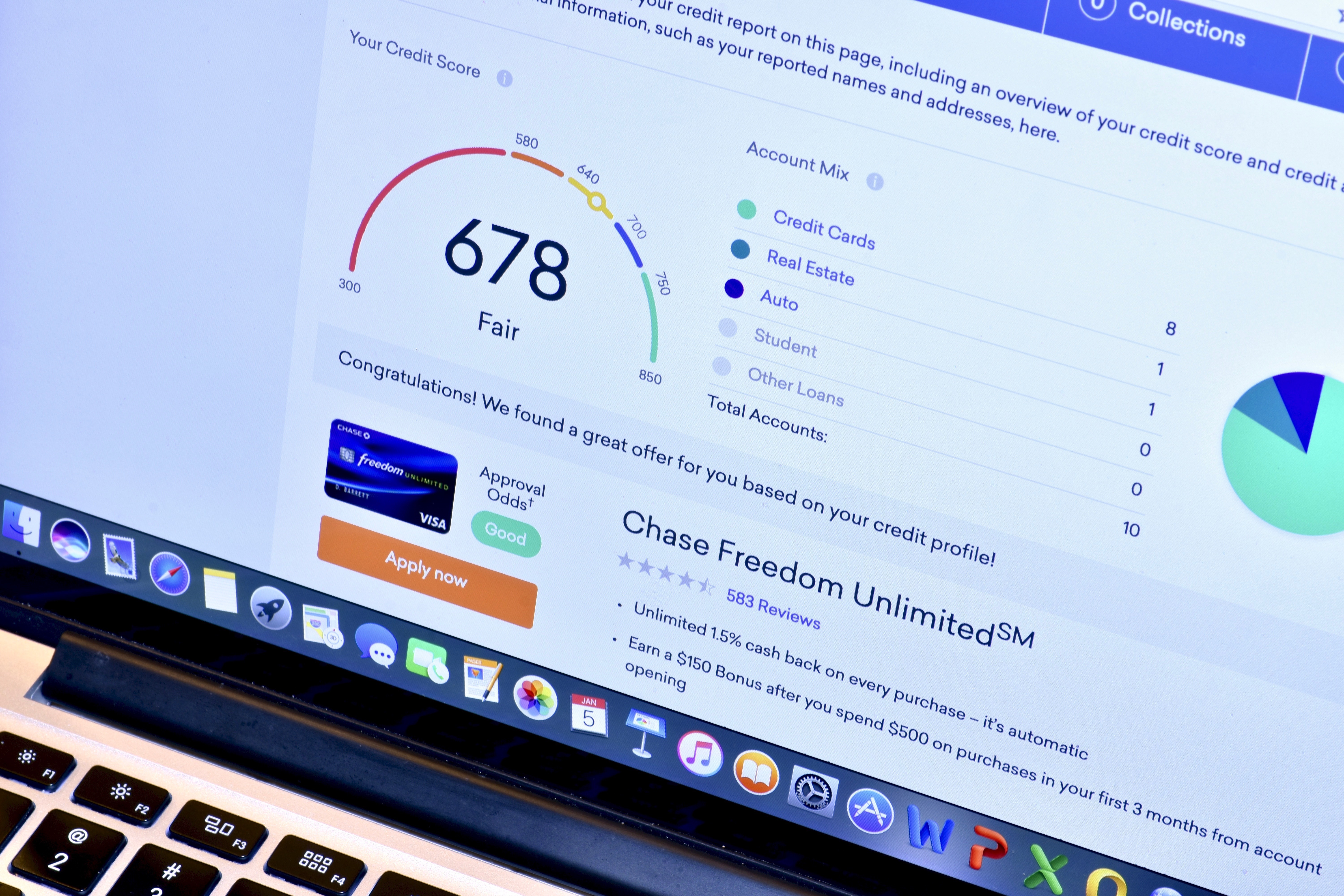Epic Equifax Breach Hits 143 Million: What to Do Now
Hackers had access to names, Social Security numbers, birth dates, addresses and more for 143 million Equifax customers.
Here at Tom’s Guide our expert editors are committed to bringing you the best news, reviews and guides to help you stay informed and ahead of the curve!
You are now subscribed
Your newsletter sign-up was successful
Want to add more newsletters?

Daily (Mon-Sun)
Tom's Guide Daily
Sign up to get the latest updates on all of your favorite content! From cutting-edge tech news and the hottest streaming buzz to unbeatable deals on the best products and in-depth reviews, we’ve got you covered.

Weekly on Thursday
Tom's AI Guide
Be AI savvy with your weekly newsletter summing up all the biggest AI news you need to know. Plus, analysis from our AI editor and tips on how to use the latest AI tools!

Weekly on Friday
Tom's iGuide
Unlock the vast world of Apple news straight to your inbox. With coverage on everything from exciting product launches to essential software updates, this is your go-to source for the latest updates on all the best Apple content.

Weekly on Monday
Tom's Streaming Guide
Our weekly newsletter is expertly crafted to immerse you in the world of streaming. Stay updated on the latest releases and our top recommendations across your favorite streaming platforms.
Join the club
Get full access to premium articles, exclusive features and a growing list of member rewards.
Updated Sept. 8 with additional comment from Equifax. Also see our guide to see if you're impacted.
There's some terrible news if you do business with consumer credit monitoring agency Equifax (or even if you don't). Your sensitive personal info — including Social Security and possibly driver's license numbers — may be in the hands of data thieves. This is arguably the worst data breach ever.

What to Do Now
- Go to Equifax's website to see if your data was compromised. We have step-by-step instructions that are easy to follow.
- Read our advice on what to do after a data breach. Ignore the parts about passwords and credit cards, as those don't apply in this case, but follow our instructions about how to place a fraud alert on your credit files.
- Look into signing up with an identity protection service.
- UPDATE Sept. 11: We now think it might be best to just institute a credit freeze. Our step-by-step page linked to above shows you how.
What Happened
Equifax on Thursday (Sept. 7) reported a security breach that could impact 143 million consumers. That's not quite as big as last year's Yahoo's breach that compromised up to 1 billion customer accounts, but it's much worse. The data accessed — names, Social Security numbers, birth dates, addresses and, in some instances, driver’s license numbers, according to the company — is critical to your privacy and security. Those first four pieces of data are everything that an identity thief would need to pretend that he's you.
Equifax says credit-card numbers for roughly 209,000 people were also accessed by the hackers, as were dispute documents with "personal identifying information" for about 182,000 people. That may sound worse than getting SSNs, but it's not — credit-card fraud is easily resolved, and customers are almost never on the hook for fraudulent charges. But with your name, address, date of birth and SSN, an identity thief could just have new credit cards issued in your name and sent to the thief's mailing address.
MORE: What to Do After a Data Breach
Equifax discovered the breach on July 29. Hackers apparently used a website vulnerability to access files, with the breach occurring from mid-May through July, according to Equifax's investigation.
"This is clearly a disappointing event for our company, and one that strikes at the heart of who we are and what we do," Equifax chairman and CEO Richard F. Smith said in a statement posted to a website created by Equifax that details the breach and steps you can take to protect yourself. "I apologize to consumers and our business customers for the concern and frustration this causes."
Get instant access to breaking news, the hottest reviews, great deals and helpful tips.
When asked why Equifax waited until Sept. 7 to inform the public when it discovered the intrusion on July 29, the company's director of social media and PR, Francesca De Girolami, shared the following statement:
As soon as Equifax discovered the unauthorized access, Equifax acted immediately to stop the intrusion. The company promptly engaged a leading, independent cybersecurity firm which has been conducting a comprehensive forensic review to determine the scope of the intrusion, including the specific data impacted. Because this incident involves a substantial amount of personal identifying information, the investigation has been complex and time-consuming. As soon as we had enough information to begin notification, we took appropriate steps to do so.
Interestingly, Bloomberg News reported that three Equifax executives sold company shares worth $1.8 million after the breach was discovered by the company, but before today's disclosure.
You can check to see if you're impacted by Equifax's breach with a tool on the company's website. Enter your last name and the last six digits of your Social Security information, and Equifax will tell you if your data was compromised. If so, you'll get a "thank you" with a date notifying you when you can enroll in the TrustedID protection Equifax is offering (see below). If not, you'll see a note that you are "not impacted."
You don't need to have directly done business with Equifax for your sensitive personal information to be in their databases. If you've ever applied for a loan, mortgage or credit card in the United States, the company probably has your information, and it was probably lost to these data thieves. At least one Tom's Guide staffer was affected.
If you're one of the people whose credit-card numbers or dispute documents feel into the wrong hands, Equifax is notifying you by direct mail notices.
Equifax is also offering credit monitoring provided by a service called TrustedID to customers hit by the breach. The TrustedID Premier plan being offered features three-bureau credit monitoring of credit reports by Equifax, Experian and TransUnion as well as the ability to lock and unlock Equifax's credit reports. (Equifax happens to own TrustedID, so there may be an inherent conflict of interest.) You also get identity-theft insurance and internet scanning for your Social Security number. The service is free for a year.
Equifax has also set up a dedicated call center, which is open every day from 7 a.m. to 1 a.m. ET. You can reach the call center at 866-447-7559 with questions about the breach.
To place a fraud alert on your files, contact one of the three major credit-reporting agencies — Equifax, TransUnion, or Experian. To speak to Equifax, call 1-888-766-0008 or visit this web page. To contact Experian, call 1-888-397-3742 or go here. For TransUnion, the phone number is 1-800-680-7289 and the link is here. The agency you place a fraud alert with will contact the other two. You can renew the fraud alert every 90 days (it's free to do so).
Once the fraud alert is in effect, you'll be notified every time someone tries to access your credit report.
Philip Michaels is a Managing Editor at Tom's Guide. He's been covering personal technology since 1999 and was in the building when Steve Jobs showed off the iPhone for the first time. He's been evaluating smartphones since that first iPhone debuted in 2007, and he's been following phone carriers and smartphone plans since 2015. He has strong opinions about Apple, the Oakland Athletics, old movies and proper butchery techniques. Follow him at @PhilipMichaels.
-
happyfeelin Question...why would I want to use an Equifax sponsored Identity Theft Service (which is exactly what was violated?).....Lifelock maybe but perhaps instead of selling services that protect us from their failures, they should work on shoring up their primary business,...just saying...Reply -
yannisgk THEY DON'T GIVE A DAMN ABOUT SECURITY (A PLAIN AND CRUEL SORRY AND THE HISTORY GOES ON)Reply -
justinloase your last name and the last six digits of your Social Security information......nty and why isn't this all over the major news?Reply -
pfay If I have been breached will it hurt my credit rating if I check my credit score?Reply
Lets all start at an 800 rating from here.
I think Experian and TransUnion did he hacking. -
justinloase Reply20151437 said:If I have been breached will it hurt my credit rating if I check my credit score?
Lets all start at an 800 rating from here.
I think Experian and TransUnion did he hacking.
Tyler Durden did it -
yannisgk Reply20151286 said:your last name and the last six digits of your Social Security information......nty and why isn't this all over the major news?
NOT TOO EMBARASS THE "POOR" AMERICAN CITIZENS!!!
-
PeterKendrick Moreover, for the voluntary service they are providing after the effects in fact they lure people into accepting the rights of waive.Reply -
rgd1101 Reply20151722 said:20151286 said:your last name and the last six digits of your Social Security information......nty and why isn't this all over the major news?
NOT TOO EMBARASS THE "POOR" AMERICAN CITIZENS!!!
Could you stop shouting? -
USAFRet Reply20151286 said:your last name and the last six digits of your Social Security information......nty and why isn't this all over the major news?
It is.
I saw it on the news last night, and again this morning.
There is also the other little news story...a major hurricane about to decimate Florida. -
jghays7 The Check Potential Impact link on https://www.equifaxsecurity2017.com/potential-impact/ shows up as UNSAFE in Chrome.Reply
Also try running the https URLS using Mozilla Observatory - https://trustedidpremier.com Fails.
 Club Benefits
Club Benefits











